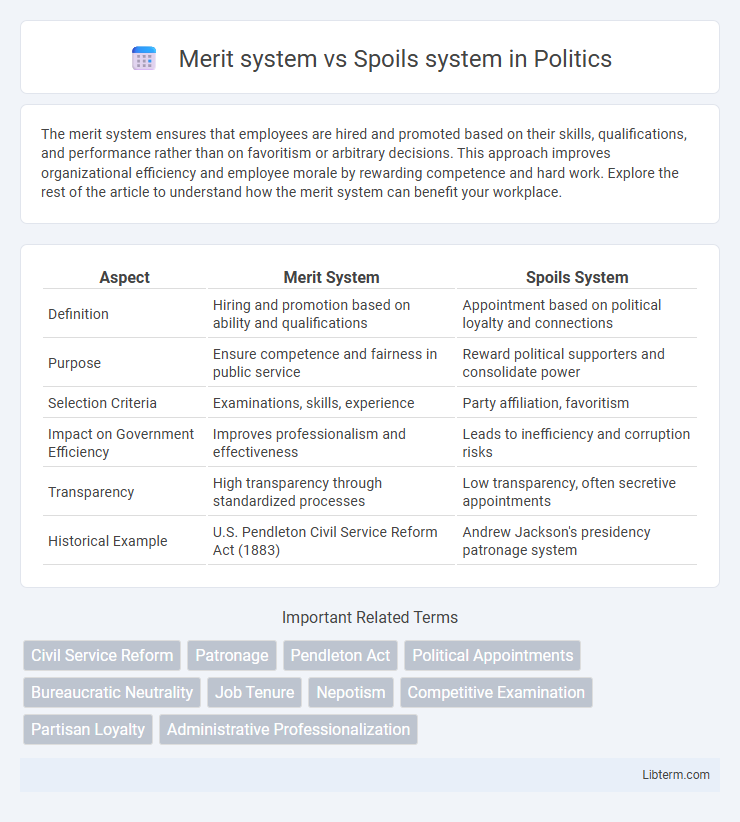The merit system ensures that employees are hired and promoted based on their skills, qualifications, and performance rather than on favoritism or arbitrary decisions. This approach improves organizational efficiency and employee morale by rewarding competence and hard work. Explore the rest of the article to understand how the merit system can benefit your workplace.
Table of Comparison
| Aspect | Merit System | Spoils System |
|---|---|---|
| Definition | Hiring and promotion based on ability and qualifications | Appointment based on political loyalty and connections |
| Purpose | Ensure competence and fairness in public service | Reward political supporters and consolidate power |
| Selection Criteria | Examinations, skills, experience | Party affiliation, favoritism |
| Impact on Government Efficiency | Improves professionalism and effectiveness | Leads to inefficiency and corruption risks |
| Transparency | High transparency through standardized processes | Low transparency, often secretive appointments |
| Historical Example | U.S. Pendleton Civil Service Reform Act (1883) | Andrew Jackson's presidency patronage system |
Introduction to Merit System and Spoils System
The Merit System emphasizes hiring and promoting government employees based on qualifications, skills, and performance, ensuring a professional and efficient public service. The Spoils System, by contrast, allocates government jobs as political rewards to supporters and allies, often leading to patronage and favoritism. This fundamental difference impacts public administration, with the Merit System promoting competence and the Spoils System fostering political loyalty.
Historical Background of Civil Service Systems
The Merit system emerged in the late 19th century as a response to widespread corruption and inefficiency in government jobs under the Spoils system, which awarded positions based on political loyalty rather than qualifications. The Pendleton Civil Service Reform Act of 1883 marked a significant milestone by establishing competitive exams to ensure hiring based on merit. This historical shift aimed to professionalize the civil service, reduce patronage, and promote fairness and competence in public administration.
Core Principles of the Merit System
The Merit System is grounded in principles of fairness, competency, and efficiency, emphasizing hiring and promotions based on qualifications, skills, and performance rather than political connections. It ensures equal employment opportunities, reduces corruption, and fosters a professional public workforce dedicated to public service. This system contrasts with the Spoils System, where appointments are driven by political loyalty rather than merit.
Core Principles of the Spoils System
The core principles of the Spoils System center on political patronage, where government jobs are awarded based on loyalty and support rather than merit or qualifications. This approach prioritizes rewarding allies and consolidating power, often leading to inefficiency and corruption within public administration. Unlike the Merit System, which emphasizes competence and fairness, the Spoils System undermines professional standards by favoring partisan interests over expertise.
Key Differences Between Merit and Spoils Systems
The merit system selects government employees based on qualifications and competitive exams, ensuring efficiency and reduced corruption, while the spoils system appoints individuals as political rewards regardless of competence, often leading to favoritism and inefficiency. The merit system promotes career professionalism and long-term stability in public service, whereas the spoils system prioritizes loyalty and political support, resulting in frequent turnover with each administration change. Key differences include objective hiring criteria in the merit system contrasted with patronage and political influence in the spoils system, impacting the quality and impartiality of government operations.
Advantages of the Merit System
The Merit System improves government efficiency by ensuring that public employees are selected and promoted based on qualifications and performance rather than political connections. This system reduces corruption and favoritism, fostering a professional and competent workforce dedicated to public service. Public trust increases as the Merit System promotes transparency, accountability, and fair treatment in civil service recruitment and retention.
Drawbacks of the Merit System
The merit system, while promoting fairness by rewarding qualifications and performance, can lead to bureaucratic rigidity and slow decision-making processes due to strict adherence to rules and procedures. It may also create challenges in removing underperforming employees, as job security protections limit managerial flexibility. Furthermore, the merit system can inadvertently discourage innovation and risk-taking when employees prioritize procedural compliance over creative problem-solving.
Advantages and Disadvantages of the Spoils System
The spoils system, characterized by appointing government jobs based on political loyalty, offers advantages such as rewarding party supporters and ensuring aligned policy implementation. However, it poses significant disadvantages including increased corruption, inefficiency due to unqualified appointments, and weakened public trust in government institutions. This system contrasts with the merit system, which emphasizes hiring based on qualifications and competence, promoting professionalism and accountability.
Impact on Public Administration and Governance
The Merit system enhances public administration efficiency by promoting qualified candidates through competitive exams, reducing corruption, and fostering stability in governance. In contrast, the Spoils system prioritizes political loyalty over competence, often leading to inefficiency and patronage-driven corruption. Consequently, the Merit system strengthens institutional integrity and policy consistency, while the Spoils system undermines bureaucratic professionalism and public trust.
Modern Trends and Future of Civil Service Systems
Modern trends in civil service systems emphasize merit-based recruitment leveraging data analytics and AI to enhance transparency and efficiency, reducing political patronage associated with the spoils system. Emerging technologies facilitate continuous performance evaluations and skills development, promoting a more competent, accountable workforce. Future prospects include integrating blockchain for secure personnel management and adopting hybrid models that balance meritocracy with strategic political appointments.
Merit system Infographic

 libterm.com
libterm.com